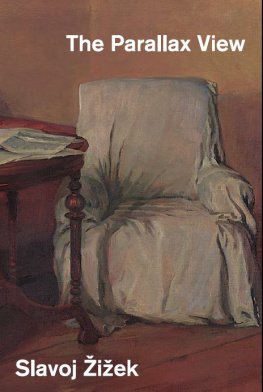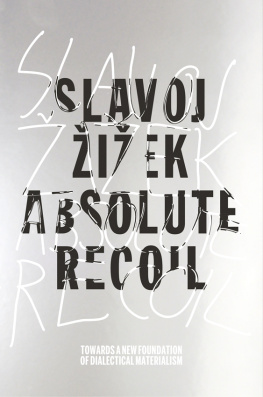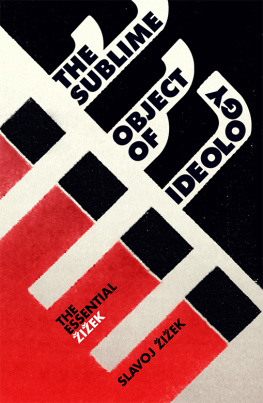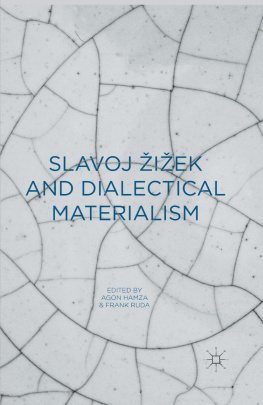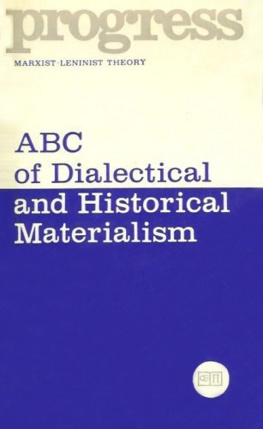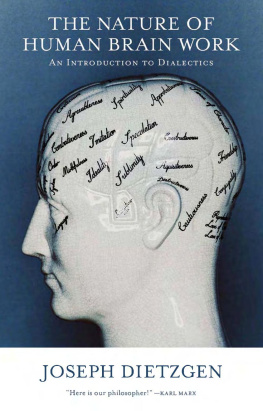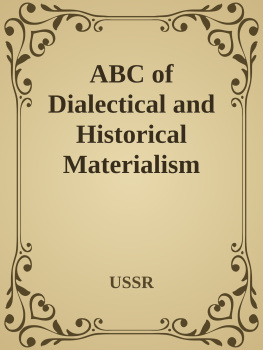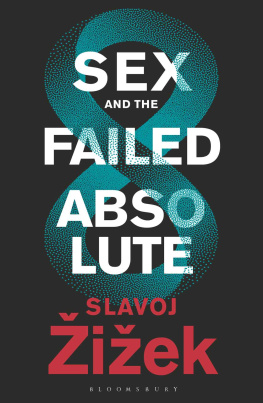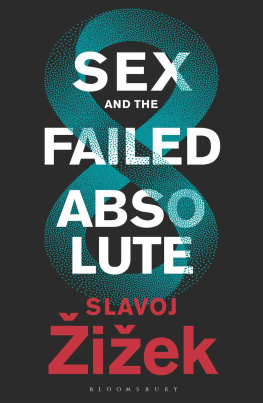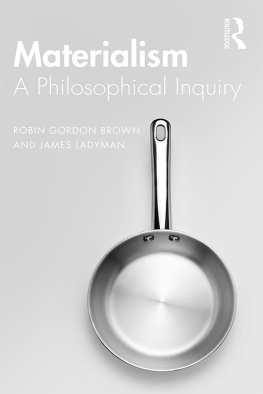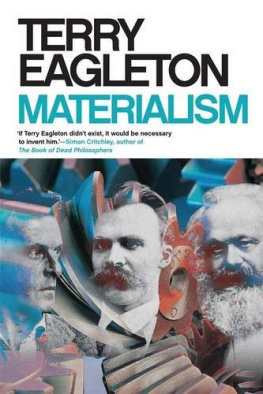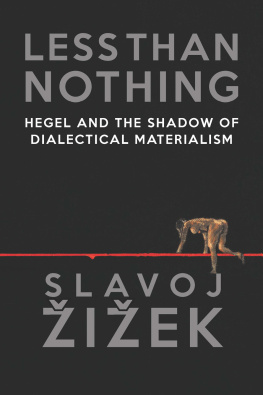chapter 1
Towards a Materialist Theory of Subjectivity
Kant avec Althusser
The Althusserian theory of ideology fully asserts the gap that separates our ideological sense-experience from the external material apparatuses and practices that sustain that experience. The theory distinguishes two levels of the ideological process: external (following the ritual, ideology as material practice) and internal (recognizing oneself in interpellation, believing). Although Althusser refers to Pascal to account for the passage between themfollow the external rituals and inner belief will comethe two dimensions remain external to each other; their relationship is that of the parallax: we observe ideological practice either from the outside, in bodily gestures, or from the inside, as beliefs, and there is no intermediate space or passage between the two. Nevertheless, (theatrical) comedy seems to provide a kind of intermediate space here, a place for passage in both directionsacting as if one believes and believing that one merely acts. When a character in a comedy feigns to believe or just acts as if he believes, he enacts (in his external behavior) an internal belief, or, vice versa, when he gets caught in his own game, actual belief can arise out of his conviction that he just believes that he acts.
The well-known formula of fetishistic disavowal je sais bien, mais quand mme is thus much more complex than it may appear. Recall the murder of the detective Arbogast in Hitchcocks Psycho : it comes Why does knowledge have to be supplemented by belief? Is it that a belief emerges in order to compensate for the failure of knowledge? We believe in God because we cannot know for sure that He exists. The solution is that even if I know it, I dont really know it: knowledge was notcannot bereally subjectively assumed, it did not occupy the place of truth (as in Lacans formula of the analysts discourse). Belief thus supplements a gap, an immanent split, within knowledge itself, hence we are not dealing here just with a gap between knowledge and belief. The same goes for our stance towards the threat of ecological catastrophe: it is not a simple I know all about the ecological threat, but I dont really believe in it. It is rather I know all about and I nonetheless believe in it, because I do not really assume my knowledge. It is this immanent gap that eludes Althussers theory of the Ideological State Apparatuses (ISAs). According to Althusser, what distinguishes the State from other social apparatuses is that
everything that operates in it and in its name, whether the political apparatus or the ideological apparatuses, is silently buttressed by the existence and presence of public, armed physical force . That it is not fully visible or actively employed, that it very often intervenes only intermittently, or remains hidden and invisibleall this is simply one further form of its existence and action one had to make a show of ones force so as not to have to make use of it; it suffices to deploy ones (military) force to achieve, by intimidation, results that would normally have been achieved by sending it into action. We may go further, and say that one can also not make a show of ones force so as not to have to make use of it . When threats of brute force, or the force of law, subject the actors in a given situation to obvious pressure, there is no longer any need to make a show of this force; there may be more to be gained from hiding it. The army tanks that were stationed under the trees of Rambouillet Forest in May 1968 are an example. They played, by virtue of their absence, a decisive role in quelling the 1968 riots in Paris.
The first thing to note here is the radical change of terrain that occurs when we pass from the first to the second level of avoiding the use of direct force. First, one makes a show of force so as not to have to use it; then, one does not make a show of force so as not to have to use it. We are effectively dealing here with a kind of negation of negation: first, we negate the direct use of force by replacing it with a mere showsay, in a tense situation in which the authorities expect violent demonstrations, they decide to parade columns of tanks through the working-class quarters of the city, expecting that this will dissuade the protestors; then, this negation is itself negated, i.e., there is no show of force, but the authorities expect this to have an even more powerful deterrent effect than an open display of forcesince the protestors know there is a police (or military) force ready to confront them, its very absence makes it all the more ominous and omnipotent. And it is this properly symbolic dimension that Althusser ignores, as is clear from a footnote attached to the quoted passage, in which Althusser draws attention to how Perry Anderson likened the presence-absence of the states armed forces to the monetary gold reserves of the Central Banks:
general circulation in all its forms (which are practically infinite) takes place independently of the presence of the gold stocks on the market. Yet such circulation would be impossible if these reserves did not exist they impinge on the market simply because they make this market (this market and no other) possible, in exactly the same way as the invisible (should I say repressed?that is indeed the right term as far as most people are concerned, since they do not care to know that these reserves exist and play a determinant role) presence of the police or armed forces impinges on a situation.
From this second example, we can see clearly what Althusser misses: the little piece of the real (the armed force, gold reserves) that can remain in the background since it can perform its function even without being used, indeed can fulfill that function even if it does not exist at all it is enough that people believe there is an armed force hidden in the background (or gold reserves in an inaccessible bank vault). The real in the background that serves as the ultimate guarantee and support of the public power is thus a spectral entitynot only does it not need to exist in reality, if it did appear and directly intervene in reality, then it would risk losing its power, since, as Lacan made clear, omnipotence ( toute-puissance ) necessarily reverts into all-in-potency ( tout en puissance ):
As already in his classic text on Ideological State Apparatuses, Althusser compulsively repeats the point about the material support of ideologymilitary, legal, and ideological apparatuses, institutional and educational machines, etc.claiming that this material support has been ignored by Marxists from Marx onwards. For traditional Marxists, materialism means that ideology (still conceived in an idealist way, as a form of social consciousness, a domain of ideas, an inverted ideal mirror of reality) is grounded in the extra-ideological material process of social (re)production (being determines consciousness); what they ignore is the proper material existence of ideology in the ISAs, in a complex institutional network of practices and rituals. However, Lacan here goes one step further than Althusser: there is a specific materiality of ideas themselves , immanent to the ideal symbolic order, insofar as this order cannot be reduced to (an expression of) meaning but functions as a meaningless machine, the machine that is the big Other beyond any concrete materialization in institutions or material practices:
You realize that my intention is not to turn them into subtle relations, that my aim is not to confuse letter with spirit and that I readily admit that one kills if the other gives life, insofar as the signifieryou are perhaps beginning to catch my driftmaterializes the instance of death. But whereas it is first of all the materiality of the signifier that I have emphasized, that materiality is singular in many ways, the first of which is not to allow of partition. Cut a letter into small pieces, and it remains the letter that it isand this in a completely different sense than Gestalttheorie can account for with the latent vitalism in its notion of the whole.
Next page



